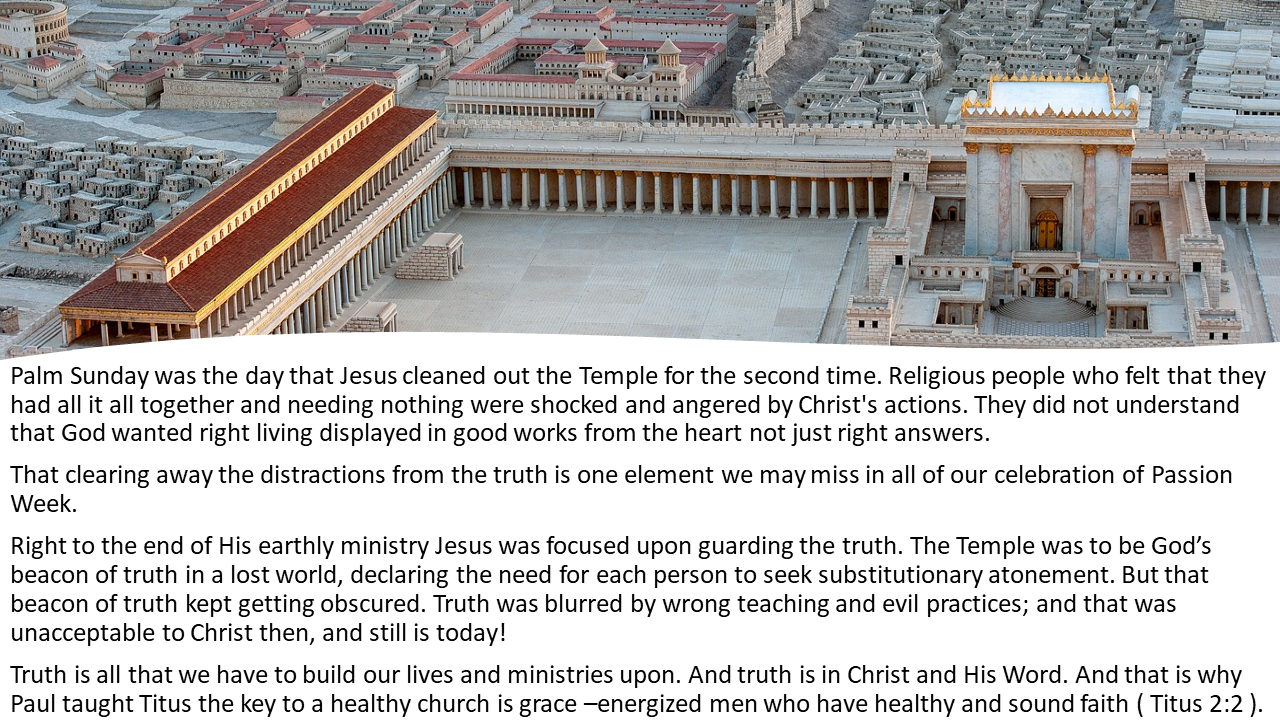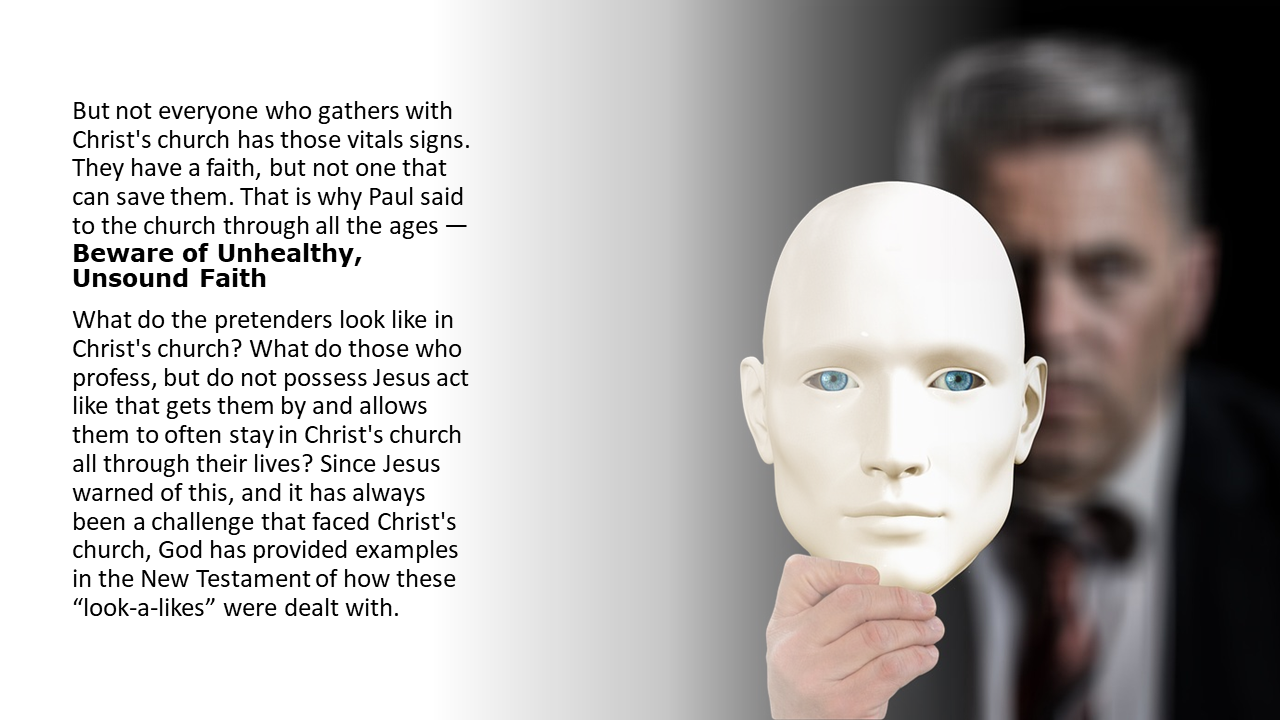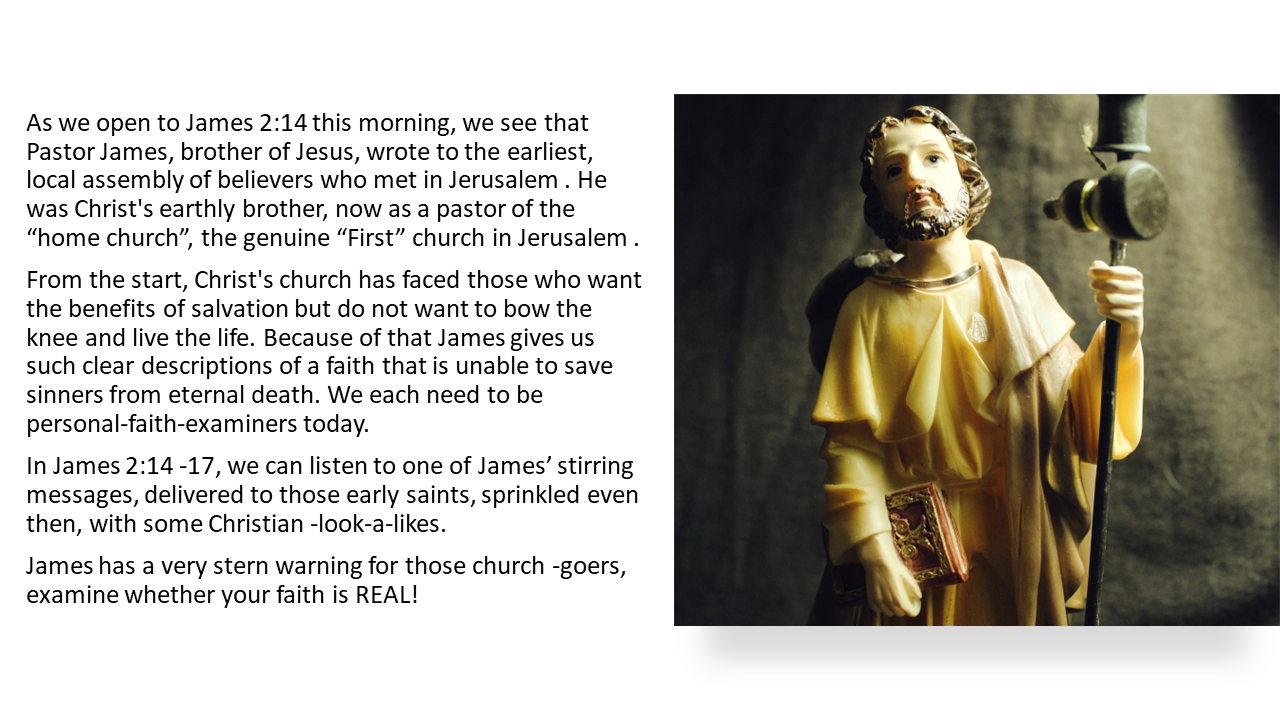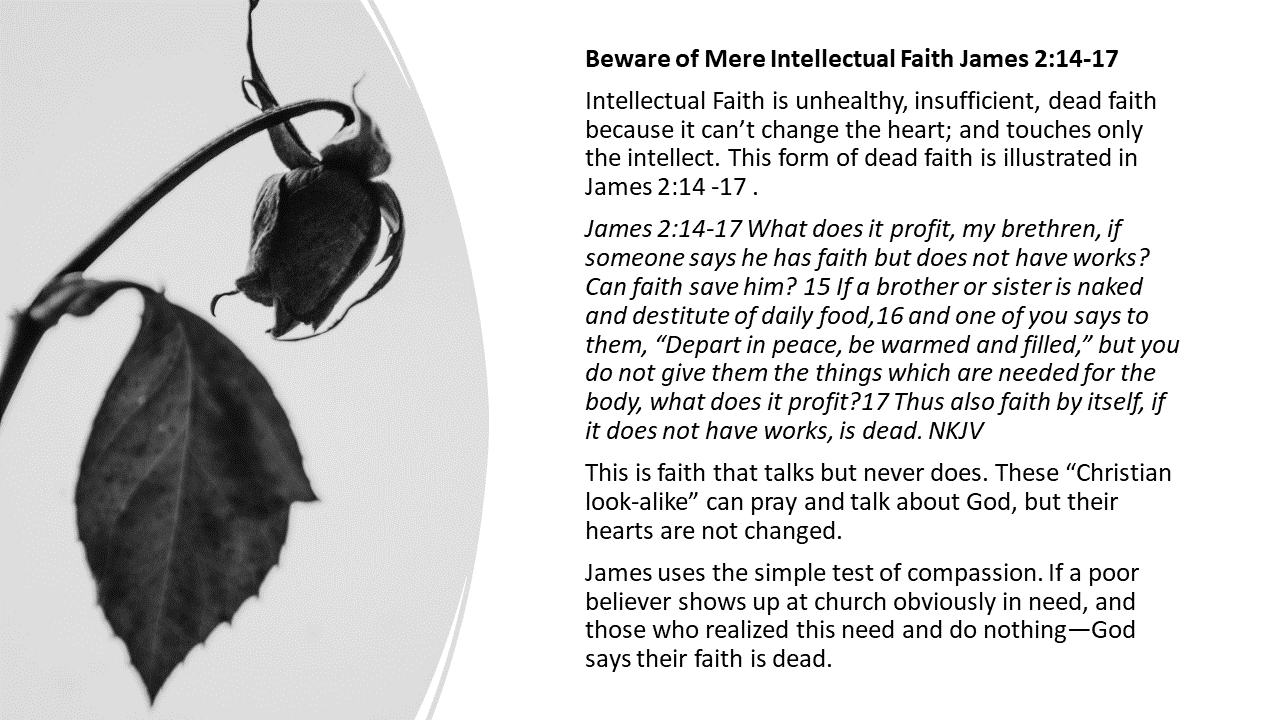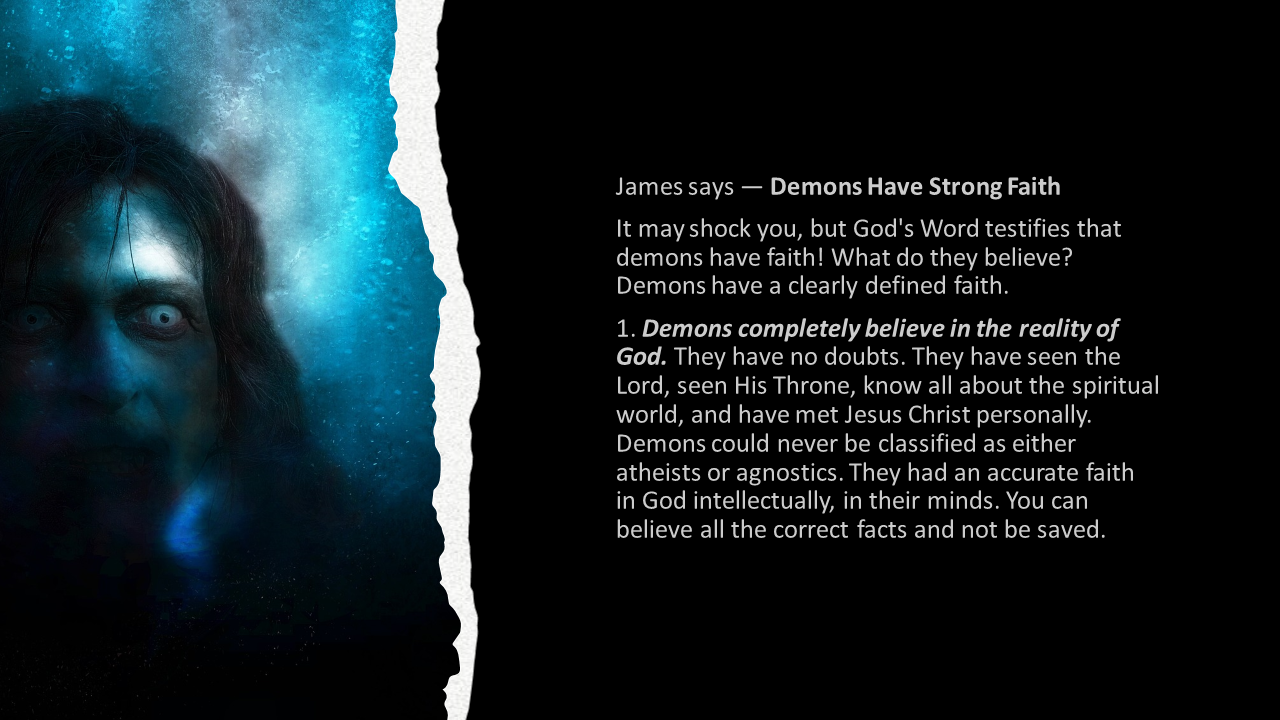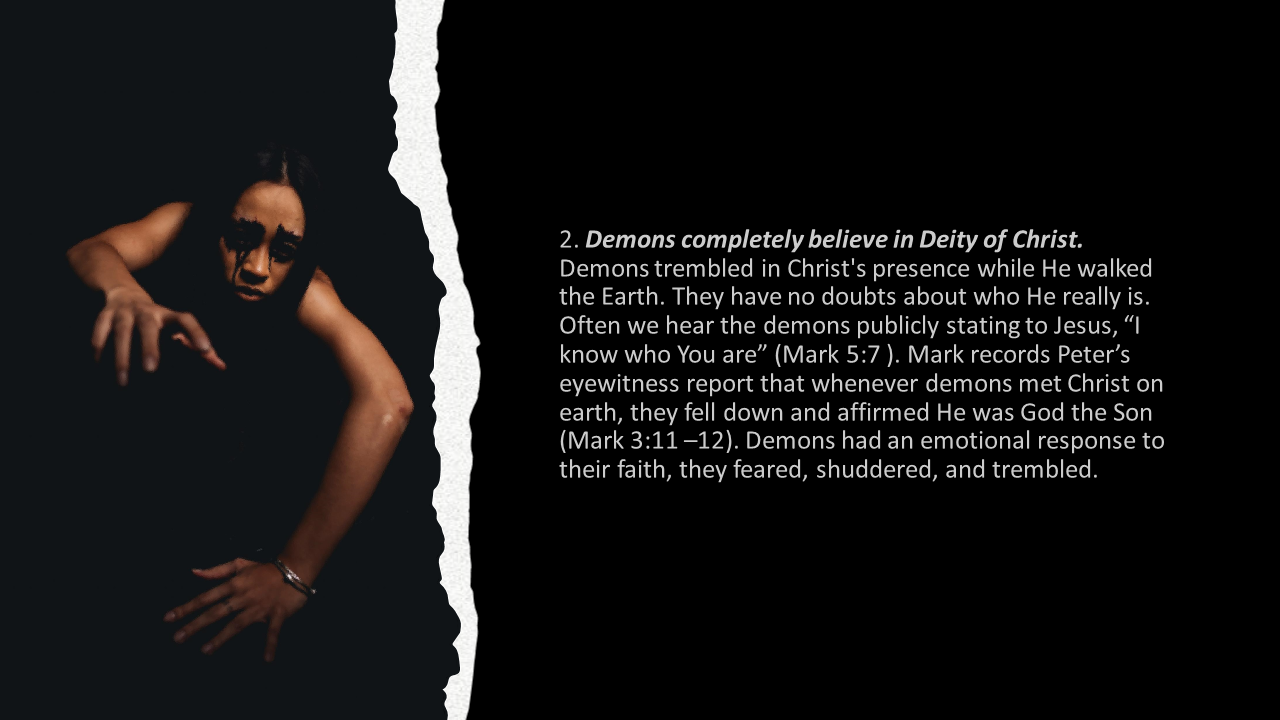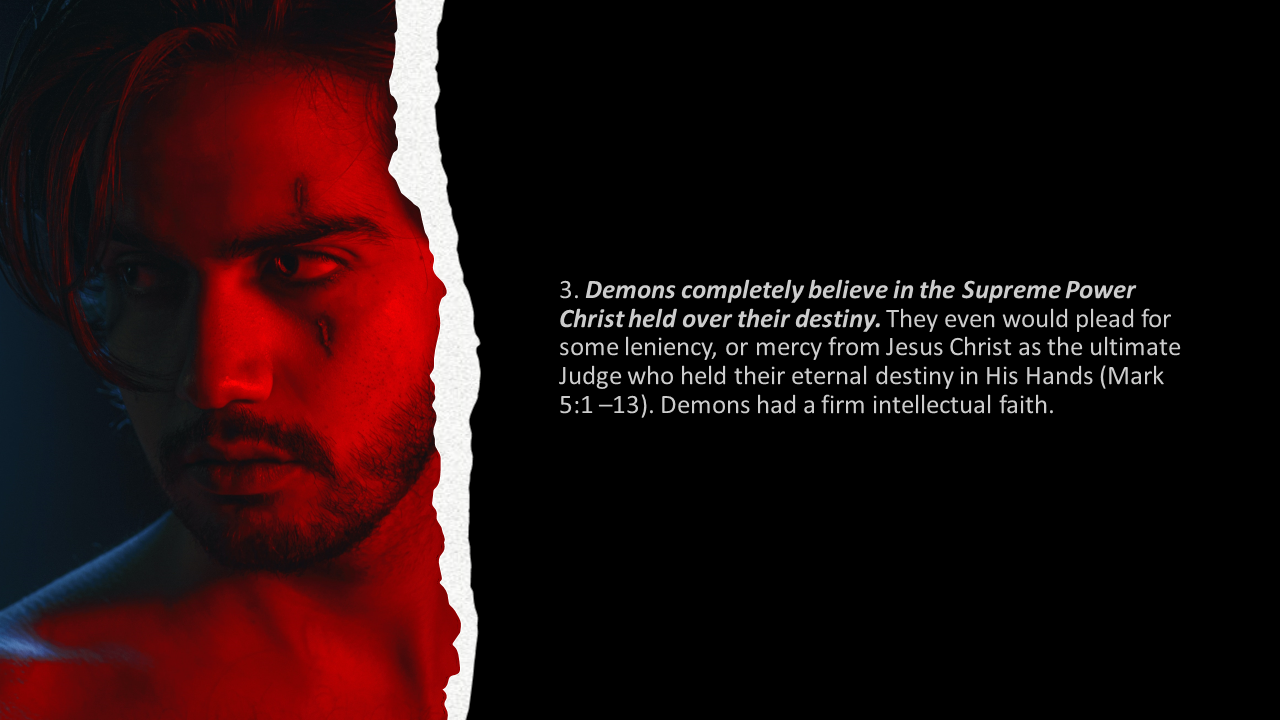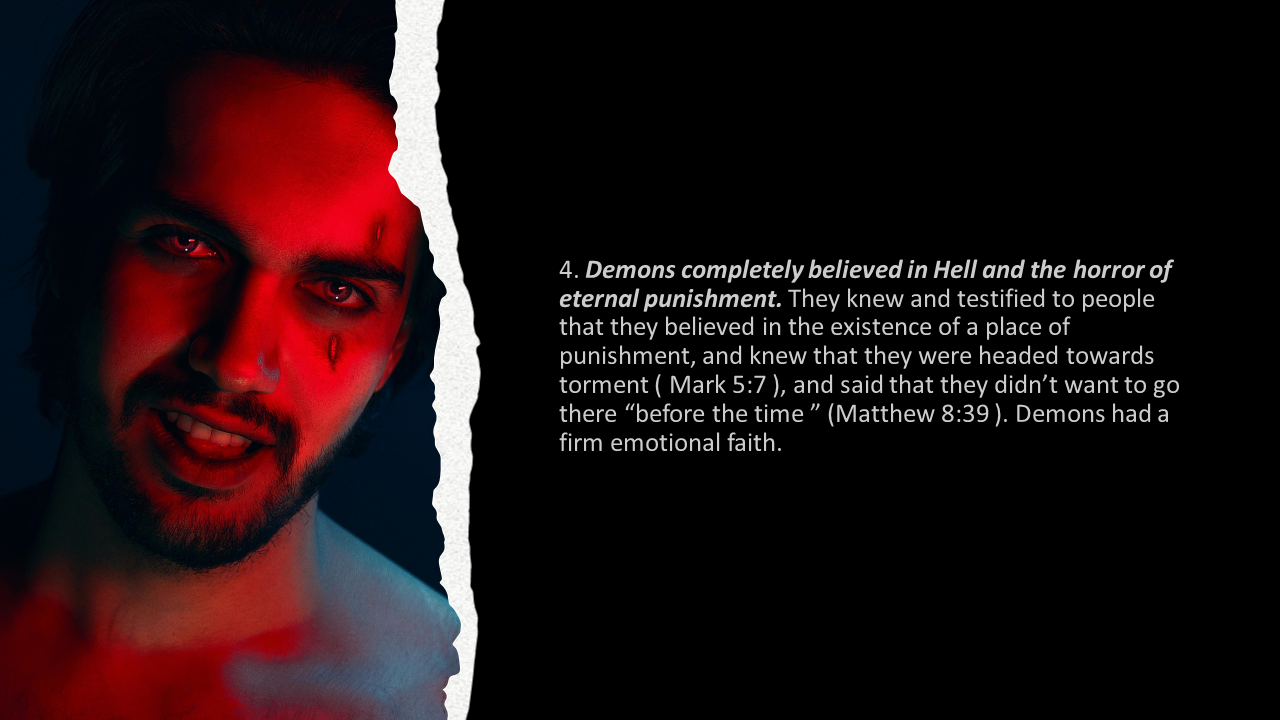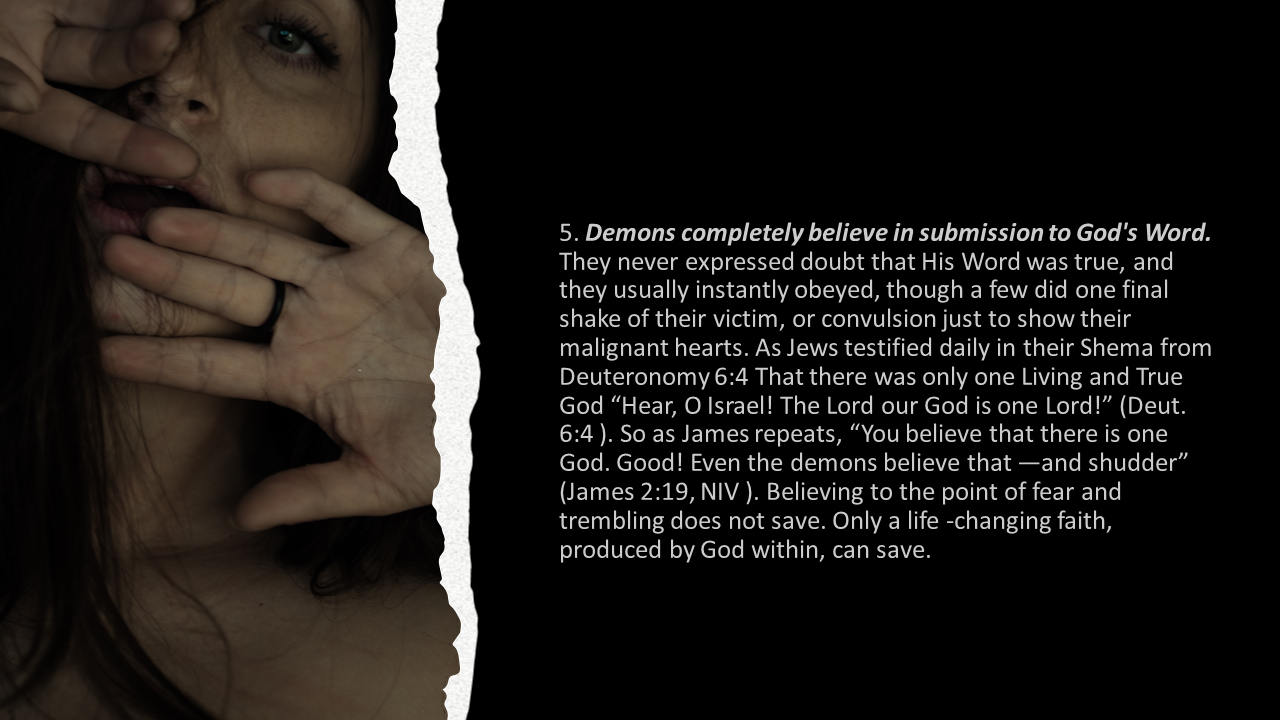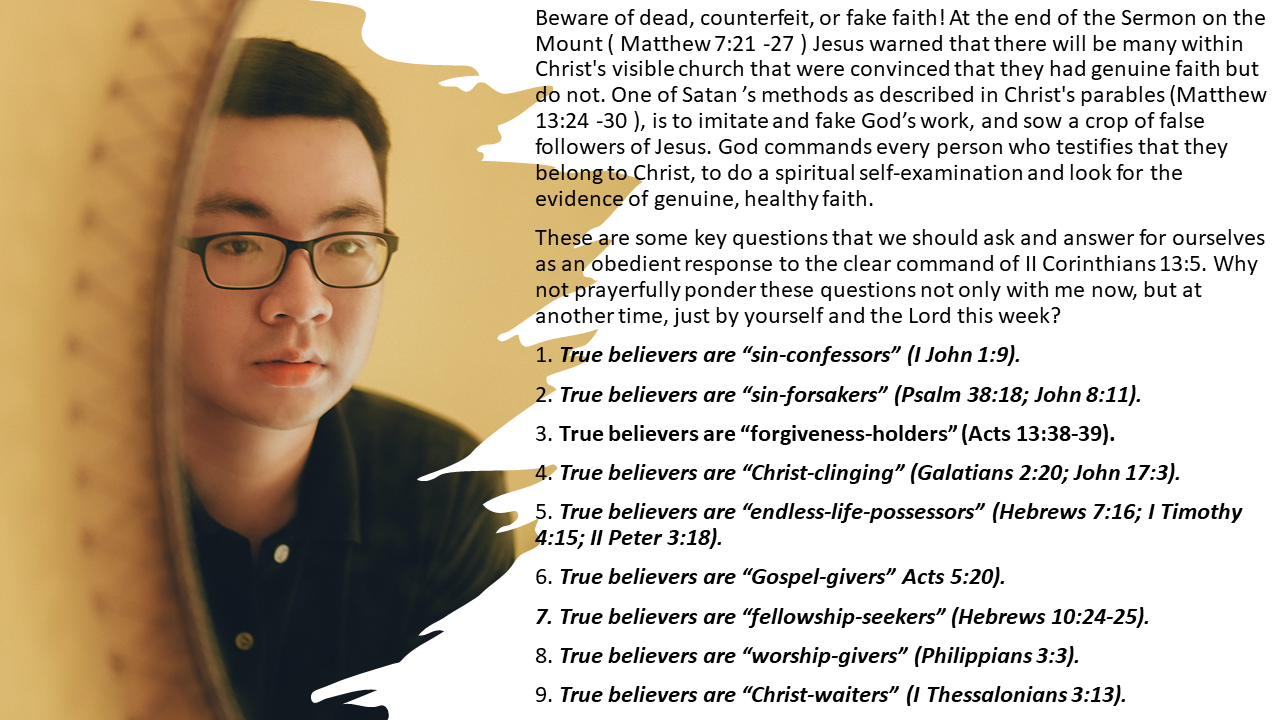GEM-19
080316AM
Palms waving, people chanting, but there was one more part of Palm Sunday—Jesus started and ended His ministry shaking up the religious establishment.
On Palm Sunday, what did Christ do right after He rode into town? What was the first event noted right after the triumphal entry? What follows that event in all three accounts (Matthew 21:12-17; Mark 11:12-19; and Luke 19:45-48)? Jesus cleaned out the Temple. Please open with me and follow along as we listen to Mark 11:1-19.
Mark 11:1-19 Now when they drew near Jerusalem, to Bethphage and Bethany, at the Mount of Olives, He sent two of His disciples; 2 and He said to them, “Go into the village opposite you; and as soon as you have entered it you will find a colt tied, on which no one has sat. Loose it and bring it…7 Then they brought the colt to Jesus and threw their clothes on it, and He sat on it.8 And many spread their clothes on the road, and others cut down leafy branches from the trees and spread them on the road… 15 So they came to Jerusalem. Then Jesus went into the temple and began to drive out those who bought and sold in the temple, and overturned the tables of the money changers and the seats of those who sold doves.16 And He would not allow anyone to carry wares through the temple. 17 Then He taught, saying to them, “Is it not written, ‘My house shall be called a house of prayer for all nations’? But you have made it a ‘den of thieves.’ ”18 And the scribes and chief priests heard it and sought how they might destroy Him; for they feared Him, because all the people were astonished at His teaching.19 When evening had come, He went out of the city. NKJV
Jesus Shook up The Religious
Palm Sunday was the day that Jesus cleaned out the Temple for the second time. Religious people who felt that they had all it all together and needing nothing were shocked and angered by Christ’s actions. They did not understand that God wanted right living displayed in good works from the heart not just right answers.
That clearing away the distractions from the truth is one element we may miss in all of our celebration of Passion Week.
Right to the end of His earthly ministry Jesus was focused upon guarding the truth. The Temple was to be God’s beacon of truth in a lost world, declaring the need for each person to seek substitutionary atonement. But that beacon of truth kept getting obscured. Truth was blurred by wrong teaching and evil practices; and that was unacceptable to Christ then, and still is today!
Truth is all that we have to build our lives and ministries upon. And truth is in Christ and His Word. And that is why Paul taught Titus the key to a healthy church is grace-energized men who have healthy and sound faith (Titus 2:2).
Healthy Faith is fed by God’s Truth and that is what we need to work on this morning. Now turn with me to Acts 20:28-32.
If Jesus came back to do a visible earthly cleaning of His Church like He did in the temple during His ministry—what would He clean out? There has always been error seeping in Christ’s church. Paul said there would be infiltrators, like wolves slipping into Christ’s church.
Acts 20:28-32 “Therefore take heed to yourselves and to all the flock, among which the Holy Spirit has made you overseers, to shepherd the church of God which He purchased with His own blood.29 “For I know this, that after my departure savage wolves will come in among you, not sparing the flock. 30 “Also from among yourselves men will rise up, speaking perverse things, to draw away the disciples after themselves. 31 “Therefore watch, and remember that for three years I did not cease to warn everyone night and day with tears.32 “So now, brethren, I commend you to God and to the word of His grace, which is able to build you up and give you an inheritance among all those who are sanctified. NKJV
As we saw last time, Jesus warned of Christian look-a-likes who do not have those vital signs of living faith. Do you remember those vital signs that are increasingly to be present in the life of a true believer?
Vital Signs of Living Faith
These are some key questions that we should ask and answer for ourselves as an obedient response to the clear command of II Corinthians 13:5[1].
- True believers are “sin-confessors” (I John 1:9).
- True believers are “sin-forsakers” (Psalm 38:18; John 8:11).
- True believers are “forgiveness-holders” (Acts 13:38-39).
- True believers are “Christ-clinging” (Galatians 2:20;John 17:3).
- True believers are “endless-life-possessors” (Hebrews 7:16; I Timothy 4:15; II Peter 3:18).
- True believers are “Gospel-givers” Acts 5:20).
- True believers are “fellowship-seekers” (Hebrews 10:24-25).
- True believers are “worship-givers” (Philippians 3:3).
- True believers are “Christ-waiters” (I Thessalonians 3:13).
But not everyone who gathers with Christ’s church has those vitals signs. They have a faith, but not one that can save them. That is why Paul said to the church through all the ages—
Beware of Unhealthy, Unsound Faith
What do the pretenders look like in Christ’s church? What do those who profess, but do not possess Jesus act like that gets them by and allows them to often stay in Christ’s church all through their lives? Since Jesus warned of this, and it has always been a challenge that faced Christ’s church, God has provided examples in the New Testament of how these “look-a-likes” were dealt with.
As we open to James 2:14 this morning, we see that Pastor James, brother of Jesus, wrote to the earliest, local assembly of believers who met in Jerusalem. He was Christ’s earthly brother, now as a pastor of the “home church”, the genuine “First” church in Jerusalem.
From the start, Christ’s church has faced those who want the benefits of salvation but do not want to bow the knee and live the life. Because of that James gives us such clear descriptions of a faith that is unable to save sinners from eternal death. We each need to be personal-faith-examiners today.
In James 2:14-17, we can listen to one of James’ stirring messages, delivered to those early saints, sprinkled even then, with some Christian-look-a-likes.
James has a very stern warning for those church-goers, examine whether your faith is REAL!
Beware of Mere Intellectual Faith James 2:14-17
Intellectual Faith is unhealthy, insufficient, dead faith because it can’t change the heart; and touches only the intellect. This form of dead faith is illustrated in James 2:14-17.
James 2:14-17 What does it profit, my brethren, if someone says he has faith but does not have works? Can faith save him? 15 If a brother or sister is naked and destitute of daily food,16 and one of you says to them, “Depart in peace, be warmed and filled,” but you do not give them the things which are needed for the body, what does it profit?17 Thus also faith by itself, if it does not have works, is dead. NKJV
This is faith that talks but never does. These “Christian look-alike” can pray and talk about God, but their hearts are not changed.
James uses the simple test of compassion. If a poor believer shows up at church obviously in need, and those who realized this need and do nothing—God says their faith is dead.
As a Christian we are to be doing good to everyone we can, especially believers (Galatians 6:10). And when we do so, Jesus said it is just like we fed and clothed Him (Matthew 25:40). John emphasized salvation changes our self-focused hearts into hearts of compassion like Christ as an evidence of true believers. Look at what he says in I John 3:17-18:
“If anyone has material possessions and sees his brother in need but has no pity on him, how can the love of God be in him? Dear children, let us not love with words or tongue but with actions and truth” (1 John 3:17–18, niv).
Do you remember the story Jesus told about three busy travelers on theJericho to Jerusalem highway? All three were headed to a good place—Jerusalem. All three had plans and a schedule that were not bad. But only one had true compassion in their heart like Christ’s. We call that story the parable of the Good Samaritan. We all know it from Luke 10:25-37.
But sometimes we need to be reminded that the two religious passer-bys (the Levite and the priest) were students of God’s Word. Both of them could articulate and defend their faith, but neither of them displayed that faith in good works prompted by God’s love.
Look closely at James 2:14. The literal rendering of that verse should be “Can that kind of faith save him?” Can faith that never gets put into action as love-prompted good works be real? The answer is NO. Faith without good works is false and dead as v. 17 goes on to state.
Over 400 years ago as the faithful expositor, John Calvin (1509-1564) declared while he preached through these verses, “It is faith alone that justifies, but faith that justifies can never be alone.” The word alone in James 2:17 simply means “by itself.” Sound or healthy faith, that is true saving faith, will never be by itself in a believer’s life: it always brings spiritual life, and that life produces good works. Next, look back at the Epistle of James as Pastor James Ben Joseph says—
Beware of Mere Emotional Faith James 2:18-19
Emotional Faith is described by James as a form of dead faith that people share with demons. Demons have strong faith that is intellectual and emotional. Note James 2:18-19.
James 2:18-19 But someone will say, “You have faith, and I have works.” Show me your faith without your works, and I will show you my faith by my works.19 You believe that there is one God. You do well. Even the demons believe—and tremble! NKJV
To illustrate mere emotional faith that is also dead, James uses one of the most unbelievable comparisons. He explains to us one of the inner workings of the spirit world. Only here do we see applied, what the Gospels so clearly illustrated—the complete intellectual and emotional faith of demons that can never save them. James says—
Demons Have Strong Faith
It may shock you, but God’s Word testifies that demons have faith! What do they believe? Demons have a clearly defined faith.
- Demons completely believe in the reality of God. They have no doubts. They have seen the Lord, seen His Throne, know all about the spiritual world, and have met Jesus Christ personally. Demons could never be classified as either atheists or agnostics. They had an accurate faith in God intellectually, in their minds. You can believe all the correct facts and not be saved.
- Demons completely believe in Deity of Christ. Demons trembled in Christ’s presence while He walked the Earth. They have no doubts about who He really is. Often we hear the demons publicly stating to Jesus, “I know who You are” (Mark 5:7). Mark records Peter’s eyewitness report that whenever demons met Christ on earth, they fell down and affirmed He was God the Son (Mark 3:11–12). Demons had an emotional response to their faith, they feared, shuddered, and trembled.
- Demons completely believe in the Supreme Power Christ held over their destiny. They even would plead for some leniency, or mercy from Jesus Christ as the ultimate Judge who held their eternal destiny in His Hands (Mark 5:1–13). Demons had a firm intellectual faith.
- Demons completely believed in Hell and the horror of eternal punishment. They knew and testified to people that they believed in the existence of a place of punishment, and knew that they were headed towards torment (Mark 5:7), and said that they didn’t want to go there “before the time” (Matthew 8:39). Demons had a firm emotional faith.
- Demons completely believe in submission to God’s Word. They never expressed doubt that His Word was true, and they usually instantly obeyed, though a few did one final shake of their victim, or convulsion just to show their malignant hearts. As Jews testified daily in their Shema fromDeuteronomy 6:4 That there was only one Living and True God “Hear, O Israel! The Lord our God is one Lord!” (Deut. 6:4). So as James repeats, “You believe that there is one God. Good! Even the demons believe that—and shudder” (James 2:19, niv). Believing to the point of fear and trembling does not save. Only a life-changing faith, produced by God within, can save.
Now we need to apply this sermon James has just preached to our lives today.
- First, an intellectual agreement or assent doesn’t save us. That is James’ point; intellectual belief is present in demons.
- Second, an emotional response, coupled with an intellectual response is also not sufficient. Demons had regular emotional responses to their faith in Christ as Creator, as Omnipotent Ruler, and as the Ultimate Judge. None of those intellectual and emotional responses prompted by their faith were sufficient.
Saving Faith is faith that is real, faith that has power, faith that results in a changed life.
So what is sufficient, real, saving faith? That is the point James makes. Saving faith goes beyond intellectual assent to facts, and a resulting emotional response to God’s Word—and continues into a life-transforming walk. True saving faith shows up over time in a changed life.
Be Sure You Have Vital Living Faith James 2:20-26
At the moment of responses all responses may look genuine. Simon fooled even the Apostles for a while (in Acts 8:13, 20-22), until Peter saw through the fakery and denounced him as an unrepentant charlatan.
Saving faith is always life-changing faith. Look back at what James repeats three times:
James 2:17, 20, 26: 17 Thus also faith by itself, if it does not have works,is dead. 20 But do you want to know, O foolish man, that faith without works is dead? 26 For as the body without the spirit is dead, so faith without works is dead also. NKJV
Warren Wiersbe says about these verses in James 2 the following insightful words:
“James 2 emphasized that the mature Christian practices the truth. He does not merely hold to ancient doctrines; he practices those doctrines in his everyday life.
His faith is not the dead faith of the intellectuals, or the demonic faith of the fallen spirits. It is the dynamic faith of men like Abraham and women like Rahab, faith that changes a life and goes to work for God.”
Note the word that God uses, through James, to describe dead faith means “idle, unproductive, or barren”. The idea is that nothing comes of it. Contrary to dead faith is the living reality of God’s purpose in saving us. We were saved to do good works as Ephesians 2:8-10 states:
Ephesians 2:8-10 For by grace you have been saved through faith, and that not of yourselves; it is the gift of God,9 not of works, lest anyone should boast.10 For we are His workmanship, created in Christ Jesus for good works, which God prepared beforehand that we should walk in them. NKJV
Which brings us back to Titus 2:2, and those Grace-energized lives that are always characterized by healthy faith, and healthy faith always produces good works.
Four times in Titus we see this emphasis from God upon the necessity of good works:
Titus 2:7, 14 in all things showing yourself to be a pattern of good works; in doctrine showing integrity, reverence, incorruptibility, 14 who gave Himself for us, that He might redeem us from every lawless deed and purify for Himself His own special people, zealous for good works. Titus 3:8-14 This is a faithful saying, and these things I want you to affirm constantly, that those who have believed in God should be careful to maintain good works. These things are good and profitable to men. 14 And let our people also learn to maintain good works, to meet urgent needs, that they may not be unfruitful. NKJV
Beware of dead, counterfeit, or fake faith! At the end of the Sermon on the Mount (Matthew 7:21-27) Jesus warned that there will be many within Christ’s visible church that were convinced that they had genuine faith but do not. One of Satan’s methods as described in Christ’s parables (Matthew 13:24-30), is to imitate and fake God’s work, and sow a crop of false followers of Jesus. God commands every person who testifies that they belong to Christ, to do a spiritual self-examination and look for the evidence of genuine, healthy faith.
Vital Signs of Living Faith
These are some key questions that we should ask and answer for ourselves as an obedient response to the clear command of II Corinthians 13:5. Why not prayerfully ponder these questions not only with me now, but at another time, just by yourself and the Lord this week[2]?
- True believers are “sin-confessors” (I John 1:9).
- True believers are “sin-forsakers” (Psalm 38:18; John 8:11).
- True believers are “forgiveness-holders” (Acts 13:38-39).
- True believers are “Christ-clinging” (Galatians 2:20;John 17:3).
- True believers are “endless-life-possessors” (Hebrews 7:16; I Timothy 4:15; II Peter 3:18).
- True believers are “Gospel-givers” Acts 5:20).
- True believers are “fellowship-seekers” (Hebrews 10:24-25).
- True believers are “worship-givers” (Philippians 3:3).
- True believers are “Christ-waiters” (I Thessalonians 3:13).
Each believer is uniquely born again into the family of God; but all are saved the same way—by God’s grace through faith only in Christ’s ability to take their sin upon Himself. Experiences will differ, some words will not be the same, and degrees of sanctification are always present—but the essence will always be there.
However, these 9 questions can truly become a tool to allow each believer to do that spiritual self examination and say with David:
“Search me, O Lord, and know my heart: try me, and know my thoughts: and see if there be any wicked way in me, and lead me in the way everlasting” (Ps. 139:23–24).
Appendix: John MacArthur Explains Christian Look-a-Like
“What lulls people into such deception?
- First of all, many professed Christians-and even many true Christians-hold a false doctrine of assurance. Often it is because the person who witnessed to them told them that all they had to do was make a profession of faith, walk an aisle, raise a hand, say a prayer, and never doubt what the Lord had done in their lives. Perhaps they have been taught that to ever doubt their salvation is to doubt God’s Word and integrity. Unfortunately, many evangelists, pastors, and personal workers attempt to certify a person’s salvation apart from the convicting work of the Holy Spirit and the evidence of fruit with continuance in obedience to the Word (John 8:31). But we have no right to assure a person of something we cannot be certain is true. God’s own Holy Spirit will witness His reality to those who truly belong to Him (Rom. 8:14-16).
- A second contributor to self-deception is failure of self-examination. Through a faulty and presumptuous view of God’s grace, some professed believers blithely go through life oblivious to and unconcerned about their sins. Yet the Lord tells His people to examine their lives each time they come to His table (1 Cor. 11:28). Paul tells us, “Test yourselves to see if your are in the faith; examine yourselves! Or do you not recognize this about yourselves, that Jesus Christ is in you-unless indeed you fail the test?” (2 Cor. 13:5). When a couple lives together without being married, when a person practices homosexuality, is deceptive and dishonest in business, is hateful and vengeful, or habitually practices any sin without remorse or repentance, such persons cannot be Christian-no matter what sort of experience they claim to have had or what sort of testimony they now make. God’s Word is explicit: “Do you not know that the unrighteous shall not inherit the kingdom of God? Do not be deceived; neither fornicators, nor idolaters, nor adulterers, nor effeminate, nor homosexuals, nor thieves, nor the covetous, nor drunkards, nor revilers, nor swindlers, shall inherit the kingdom ofGod” (1 Cor. 6:9-10). Again Paul warns, “For this you know with certainty, that no immoral or impure person or covetous man, who is an idolater, has an inheritance in the kingdom of Christ and God. Let no one deceive you with empty words, for because of these things the wrath of God comes upon the sons of disobedience” (Eph. 5:5-6). In each of those extremely somber warnings Paul pleads with his readers not to be deceived. The person who professes to be a Christian but who habitually and unrepentantly continues in known sin makes out God to be liar, because His Word expressly denies that any such person belongs to Him (1 John 3:6-10).
- A third cause of self-deception is inordinate concentration on religious activity. Attending church, hearing sermons, singing songs of the faith, reading the Bible, attending Bible studies, and many other perfectly good and helpful activities can actually insulate a person from the very God he is supposedly worshiping and serving. Those things can cause a believer to think he is being faithful and obedient, when in reality he may not be; and they can cause an unbeliever to think he is saved, when in reality he is not.
- A fourth cause of self-deception is what may be called the fair exchange, or balancing out, approach. Instead of confessing and asking forgiveness for his sins, a person may give himself the benefit of the doubt and rationalize his salvation by thinking that the good things he does balance out the bad, that the positive cancels the negative. But in the first place, apart from God it is impossible to do anything that is truly good, because “there is none who does good, there is not even one,” Paul tells us (Rom. 3:12), quoting David (Ps. 14:1-3; 53:1-3). In the second place, it is the sin itself-not an excess or imbalance of it-that separates us from God and brings death and damnation (Rom. 5:12; 6:23). Whatever good we might somehow accomplish would not cancel those consequences of sin, any more than eating right and exercising will save the life of a person infected with a deadly disease. His only hope is in receiving a cure for the disease, not in trying to balance off its deadly effect by keeping his body otherwise healthy. Isaiah said that the best deeds of men before God are as “a filthy garment,” that is, a menstrual cloth (Isa. 64:6).
- One is the superficial person, the one who has had little or no instruction in the gospel and who thinks that his attending Sunday school as a child, having been baptized, being a church member, or other such things put him in good standing with God.
- The other type of person is much more knowledgeable about the Bible and the gospel, and is often heavily involved in church activities of various sorts. But he lives in a constant state of sinfulness, with no thought of confessing and forsaking his sin or of seeking after righteousness. He looks to feelings, experiences, healings, angels, earthly material blessings, promises, and a host of other external things for proof of his salvation. He is not concerned about decreasing sin or increasing righteousness. He is not concerned about God’s commands, God’s standards, or God’s glory, but only what he can get out of God for himself. As Martyn Lloyd-Jones suggests, he is more concerned about the by-products of the faith than the fruit itself (Studies in the Sermon on the Mount [Grand Rapids: Eerdmans, 1977], 2:285). This group includes those who are more committed to a denomination or Christian organization than to the Word of God. It includes those who are academically interested in theology-even orthodox, biblical theology-but not in obedience to the Bible on which that theology is based. It includes those who overemphasize and distort a particular aspect of biblical truth, to the exclusion and sometimes contradiction of other truths. It encompasses those who are overindulgent in the name of grace but lack penitence.[3]
[1] Adapted and drawn from the James 2 portion of the electronic version of Wiersbe, Warren W.,The Bible Exposition Commentary, (Wheaton, IL: Victor Books) 1997.
[2] Adapted and drawn from the James 2 portion of the electronic version of Wiersbe, Warren W.,The Bible Exposition Commentary, (Wheaton, IL: Victor Books) 1997.
[3] MacArthur, John F., The MacArthur New Testament Commentary, Matthew 7:21 onward, (Chicago: Moody Press, electronic edition) 1983.



